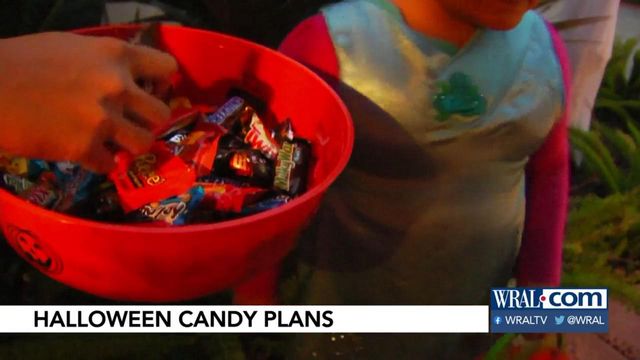Duke experts warn of 'superspreader' events during October holidays
Duke Health experts are urging people to limit large gatherings as much as possible during the October holidays. Doctors are concerned about people spreading coronavirus at Halloween parties and Day of the Dead celebrations in the next couple weeks.
Posted — UpdatedDoctors are concerned about people spreading coronavirus at Halloween parties and Day of the Dead celebrations in the next couple weeks.
Halloween is more than small children going trick-or-treating, experts said, noting that they are concerned teenagers and young adults will hold gatherings and parties that will spread the coronavirus.
Cameron Wolfe, an infectious disease specialist at Duke Health, said that there is a way to have a Halloween party but to do it safely.
Anyone who has been exposed to coronavirus shouldn’t hold or attend social gatherings with others. They must quarantine for 14 days after being exposed, according health experts, because they likely wouldn't know if they are carrying the virus without symptoms.
"When we've looked on our college campus on the amount of virus that's shared by different students," Wolfe said, "I am consistently shocked that some of the most prolific shedders of COVID are completely asymptomatic."
Doctors stressed that people cannot rely on testing alone. Just because someone tests negative does not mean that they are free to not wear a mask.
A large group of people gathering indoors with alcohol mixed in could turn into a superspreader event, Wolfe said. Alcohol and drugs at a party could inhibit a group of people's ability to reason and adhere to the Centers for Disease Control and Prevention's guidelines.
"Please don't fool yourself into believing you're safe," Wolfe said.
Trick-or-treating
"Trick-or-treating will not be as normal this year," said Emmanuel Walter Jr., chief medical officer of the Duke Human Vaccine Institute.
Walter said that children should not be gathering in large groups trick-or-treating this year.
He gave the option that children could do pumpkin carving at home or in a socially-distanced group. He also suggested that parents could set up a candy scavenger hunt for their children in the backyard. For those that do choose to trick-or-treat, Walter said children should stay in small groups and wear masks that are not just Halloween masks but CDC-approved masks.
"I just have real concerns with trick-or-treat going door-to-door," said Duke University pediatrician Chip Walker.
If someone is picking up or passing out candy on Halloween, Walter said they should sanitize their hands frequently. Instead of passing out candy to a child and possibly coming in contact with them, try putting candy in a bowl and letting them pick up the candy on their own, he said.
Day of the Dead
Many Latino families, especially Mexican families, will celebrate Day of the Dead on Oct. 31 through Nov. 2.
Day of the Dead is a religious holiday where families will prepare an altar to honor the dead. Families will usually gather together and hold events to celebrate and remember the dead. Duke doctors warned that some of these activities could increase the spread of the coronavirus.
"To make it safe ... you want to avoid the large gatherings," said Viviana Martinez-Bianchi, an associate professor in family medicine and community health.
Martinez-Bianchi said it would be dangerous to host a large dinner with multiple families. Instead, Martinez-Bianchi suggested people should cook a family recipe and deliver it to a family.
When celebrating the dead, Martinez-Bianchi suggested that a family can make an altar and masks at home. She encouraged people to join a virtual gathering to celebrate.
There are moderate-risk activities during Day of the Dead, Martinez-Bianchi explains. People can have a parade if they are more than 6 feet apart wearing masks outdoors.
Martinez-Bianchi said to avoid any indoor gatherings with singing and chanting.
Holiday travel
Wolfe said if someone was considering traveling a long distance during the coronavirus, they should think about the two weeks leading up to their travel as their "pre-quarantine."
"Think about it as a time where you can do the best you can for yourself to minimize the risk where you may inadvertently bring the risk to parents, grandparents, loved ones," he said.
If it is absolutely necessary that someone flies on a plane, Wolfe suggested they not linger in areas where large groups of people are. Wolfe suggested travelers eat their meals alone instead of in groups of people or in dining areas.
He also suggested that travelers bring two masks with them -- in case one breaks. The best kind of mask to fly with is an N-95 mask, Wolfe said.
It's best to drive somewhere if possible and avoid flying, according to Wolfe.
"Travel is an added risk," Wolfe said. "Travel moves your little bubble of people that you hang around with and engages another bubble of people who you weren’t hanging around with."
Doctors also said that people should consider the number of coronavirus cases in the areas where they are traveling and assess the risk they are taking when they travel. If someone is inviting someone to their home, they should consider how many cases of coronavirus are in their area before they do so.
• Credits
Copyright 2024 by Capitol Broadcasting Company. All rights reserved. This material may not be published, broadcast, rewritten or redistributed.






